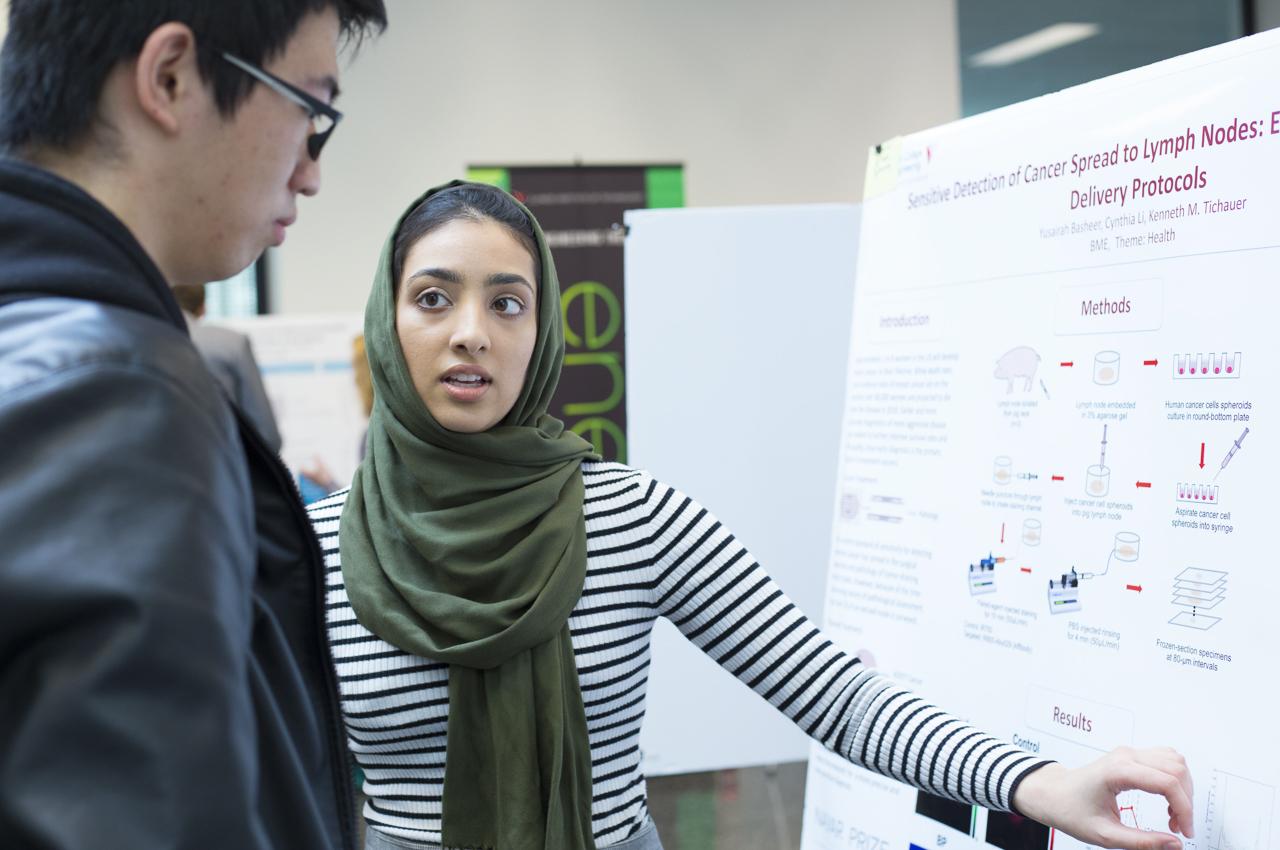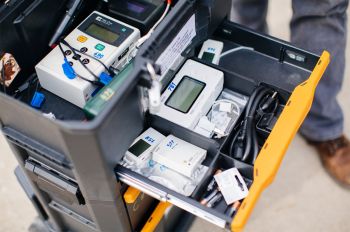Armour Summer R&D Program: Students Explore Engineering with Hands-On Research

Eight students in Armour College of Engineering have been awarded summer 2019 Armour R&D fellowships along with their faculty mentors. This program, an Armour Distinctive Education initiative, offers undergraduate engineering students the opportunity to gain hands-on research and development experience in a faculty-led laboratory.
Students have been selected to participate in the program based on the quality of project proposals submitted, which were reviewed by Natacha DePaola, Carol and Ed Kaplan Armour College Dean of Engineering, and the Distinctive Education Council.
The program runs for 10 weeks and culminates with the summer 2019 Armour R&D Expo, which will be held on July 18. During the expo, students share research results with students, faculty, alumni, and industry professionals through poster presentations.
Each project is categorized within the college’s four Engineering Themes—water, health, energy, and security—representing areas in which engineers can create solutions of global impact that advance society.
WATER
Emma Farquharson (CHE 2nd year) and Sohail Murad, professor and chair of the Department of Chemical and Biological Engineering, will be working together on the project titled “The Economic and Energy Analysis of Desalinization Processes in Central America.” This research will focus on the economic analysis of the cleaning (or desalination) of salt water within Central America and the surrounding islands. They will be conducting studies to understand the energy usage of different methods of desalinating the water in an effort to identify the most feasible way of providing clean, fresh water from the ocean to the people of Central America.
HEALTH
Jasmine Baste (BME 2nd year) and Abhinav Bhushan, assistant professor of biomedical engineering, will collaborate on their project titled “Using Microfluidic Devices to Model and Investigate Leaky Gut Syndrome.” When the intestine has increased permeability, also referred to as leaky gut syndrome, bacteria and toxins can leak through the intestine and into the body. This project will aim to mimic the environment of leaky gut syndrome and to determine if the leaky gut can be reversed to make advances in health. Even though results will be applicable for leaky gut caused specifically by alcohol, which is considered to be one of the biggest challenges, the outcomes are also generally applicable for leaky gut caused by other diseases.
Tri Huynh (BME 2nd year) and John Georgiadis, chair of the Department of Biomedical Engineering and R.A. Pritzker Professor of Biomedical Engineering, will work on their research titled “Precision Ex Vivo Brain Biopsy Assisted by Ultrasound and Haptics.” The objective of this project is to enable sub-millimeter accurate excision of targeted tissue samples (from post-mortem brains) by providing haptic feedback to the scalpel according to real-time acquired high-resolution ultrasound data. This addresses the problem that the targeted areas identified in prior MRI scans move and deform during the biopsy. The research will focus on developing an algorithm to control the force feedback of the haptic system along the needle path. Potential future applications involve accurate navigation during surgical interventions where a prior examination has detected suspicious pathology.
Yashwant Kathirvel (CHE 2nd year) and Seok Hoon Hong, assistant professor in the Department of Chemical and Biological Engineering, will begin work on their project titled “Engineering a Protective Biofilm Coating.” This research is based on creating a protective layer of friendly bacteria, also known as biofilm, to coat medical devices such as implants to inhibit hostile bacteria from growing on surfaces, as well as to sense and attack any bacteria that attempt to colonize. The investigation focuses on creating a thin and uniform layer of this biofilm and implementing the layer on a surface material, which could also lead to multiple applications in other industries.
Elias Kluiszo (BME 1st year) and Abhinav Bhushan, assistant professor of biomedical engineering, will be working on their project titled “Improved Generation of Virus-modified CAR-T Cells.”CAR-T cell therapy is a new immunotherapy treatment for cancer that essentially reprograms the body’s own immune system to fight against cancer cells. It is heralded as a new cure for blood cancer, with one treatment resulting in an 80 percent remission rate. However, it is a highly technical operation restricted to only a few institutions around the country. Studies have indicated that confining cells in smaller microfluidic devices enhances the creation of CAR-T cells. The research will compare this novel CAR T-Cell generation method to current techniques, using cell dyes on activated cells to quantify the results, which can encourage development of new CAR-T production facilities around the country.
Daniel Marten (BME 2nd year) and Abhinav Bhushan, assistant professor of biomedical engineering, will be working on the project titled “Enzymatic Expression in Metabolic Microfluidic Models.” The goal of this research is to characterize and measure the activity of a key drug-metabolizing enzyme in laboratory models of the human gut. Promising future applications stand to use these models to test drug efficacy and safety, which calls for a greater understanding of how these gut models will metabolize the drugs, or if they are capable of doing so in their current state.
Victor Quiroz (BME 3rd year) and Georgia Papavasiliou, associate professor of biomedical engineering, will be exploring the topic of “Novel 3D Scaffold with Peptide Ligands for the Promotion of Chondrocyte and Osteoblast Differentiation of MCSs.” This project aims to embed stem cells inside hydrogels with varying stiffness while also controlling the amount of biochemical-signaling amino acids within them. The purpose of altering these two variables is to encourage stem cells to become bone and cartilage cells. Experiments to find the optimal ratio of these variables will be conducted while exploring the structural characteristics of new gels, providing a deeper understanding of how stem cells react to different material properties.
ENERGY
Yuzhe Lim (ECE 4th year) and Francisco Ruiz, associate professor of mechanical and aerospace engineering, will be working on their project titled “Magnetic Levitation (MagLev) Vehicle.” This project will examine the innovative idea of electromagnetic levitation as a source of power that could change the future of transportation infrastructure. As most of the MagLev platforms introduced to the market today are not suitable for transportation or robotic purposes, this research will seek to develop a low-cost and highly efficient magnetic levitation suspension for smaller transportation vehicles.




